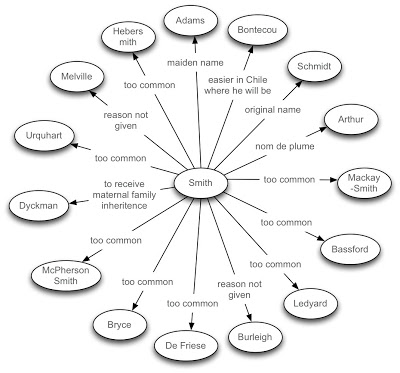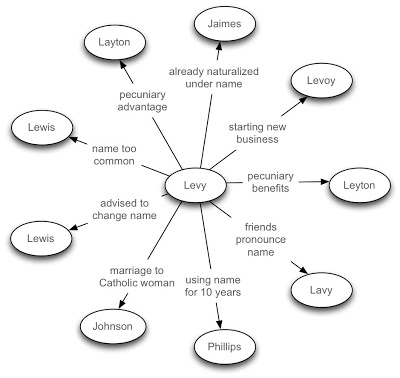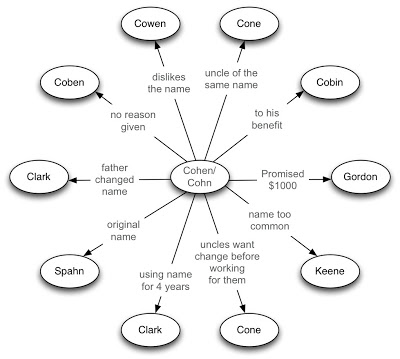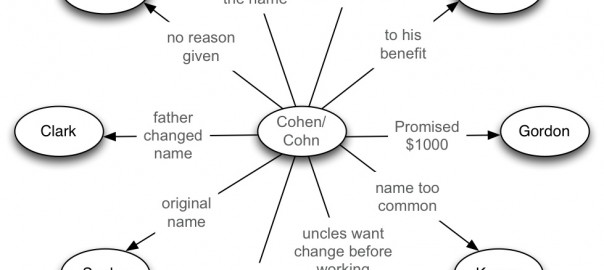Back in May 2011 I discussed a book Petitions for Name Changes in New York City 1848-1899 as part of a broader article on the myth of Ellis Island name changes. The book transcribes 890 name change petitions that were made in New York City in the 52 years between 1848 and 1899. In my original article, I discuss many of the reasons people changed their names. In this post I want to go back to take a look from a slightly different perspective.
That names changed due to racism and antisemitism is not hard to show. While not every name change says it explicitly, without a doubt many of the name changes that are for ‘pecuniary benefit’ or similar reasons are due to the petitioners believing (perhaps rightly for the time) that their names were too ethnic sounding to allow them to flourish without discrimination.
Some, however, were explicit. Indeed, the first two petitions listed in the book are:
Petition (11 July 1892) of William Abraham, aged over 21, residing at 323 E. 3rd St., unmarried. His father, Morris Rogozinski, came to the U.S. in 1866 from Russia and assumed the name Abraham. Petitioner’s father is dead. His mother’s name is Sarah. He states that as the name Rogozinski and Abraham are of Semitic origin, it will be to his material and pecuniary advantage to bear a name that will not be so distinctive. He wishes to assume legally the name William Abraham Rodgers.
Petition (25 Mar. 1891) of Joseph Abrahamson, age 21 on 2 Nov. 1890, residing at 2093 Third Ave. He was employed about 8 years by one Russak, now deceased, who had 3 other Josephs in his employ and called the petitioner Edson. The petitioner has become a Christian and is about to marry an Episcopalian young lady. He and his bride desire that ‘all semblance of a Jewish surname shall be removed from the petitioner.’ He wishes to assume legally the name Joseph Abraham Edson.
Looking at patterns in the names, however, we can learn some more. For example, which names were changed the most?
It may not surprise anyone to know that the most commonly changed name is also the most common name in the United States, Smith. Consider for a moment over a hundred years ago how people found each other. New York City had city directories, pre-cursors to phone books, which listed people by name – but what happened when there were 50 other John Smiths? What if 10 of those John Smiths were in the same business as you? It’s not hard to see why someone with the name Smith might want to change their name to something more unique. According to the 2000 US Census, there were 2,376,206 people in the US with the last name Smith. I don’t know how many people in the US, or even just New York City, had the name Smith in the years covered in this book, but there is no question even then it was a very common name. Take a look at the following chart that looks at the name changes from Smith, and the reasons given for each change:
 |
| Name changes from Smith, with reasons. (Click to enlarge) |
Note that more than half of the petitions were due to commonality of the name, and even more were probably for that reason (although not explicitly shown in the petitions). The next most often petitioned names, however, were not among the most common US surnames, but rather of the most obviously Jewish surnames – Levy and Cohen. I’ve created charts of the name changes from Levy and Cohen (with Cohn) that illustrate the changes made, and why the changes were made:
 |
| Name changes from Levy, with reasons. (Click to enlarge) |
Among the people who changed their names from Levy, while none explicitly point out the removal of ‘Semitic origin’ like the example above, it is implicit in almost all of them (one says it is because the name is too common).
 |
| Name change from Cohen and Cohn, with reasons. (Click to enlarge) |
In the changes from Cohen and Cohn, there is a similar implicit pattern. Only two petitions list commonality as a reason (the Keene and Spahn petitions). Compare that to Smith where more than half of the name changes are attributed to the commonness of the name.
Clearly something else is going on that causes these name changes to occur, and if we can’t know that the names changed for the reasons in the first two petitions from the book, we can certainly infer that the reasons are fairly similar. The desire to ‘not be so distinctive’ was strong among many immigrants, and changing ones name to fit in better was an easy way to remove distinctiveness.
The reasons behind these name changes are very different from some of the other reasons I’ve discussed in the past, such as children having to take their mother’s surnames because it was difficult for Jews to be civilly married in places like Austria in the 19th century. While the circumstances are very different, it’s no less complicated for family members try to research their family when names change. Moreover, the circumstances, while different, still emanate from racism. In the case of mother’s surnames, discrimination against Jewish families in the civil registration process, and in the case of these NYC name changes, discrimination that causes the petitioners to want to change their surnames to fit in better.
Interestingly, the fact that many Jews did not have surnames until just over 200 years ago probably contributes to the lack of commonness as a reason for changing one’s surname. Other reasons are more common, however, such as changing a name that was derogatory (assigned by antisemitic bureaucrats) when possible, changing from a mother’s surname to a father’s surname (common when coming to the US where name changes were easier), and changes to try to prevent discrimination. Name changes of Jewish immigrants to Israel is a whole different topic, but encompassed a whole different set of reasons, including a desire to Hebraize one’s surname – in some cases this was not a choice but a requirement if the person worked in the government or military in Israel.
What interesting name change stories do you have in your family?

1 thought on “Racism and Commonality as Reasons for Name Changes”